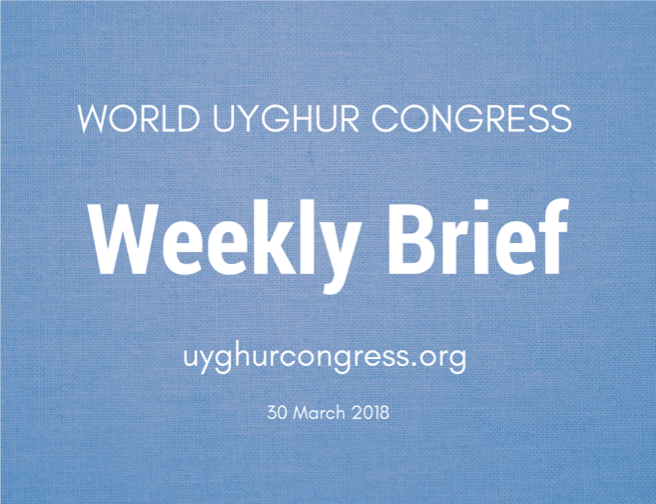Weekly Brief March 30th

World Uyghur Congress, 30 March 2018

Religious Persecution of Uyghurs Increases as Xi Jinping Consolidates Power
Multiple media outlets reported this past week about the increasing and targeted religious persecution of Uyghurs in East Turkestan under Chinese President Xi Jinping. Forbes contributor Olivia Enos wrote a piece on how the religious persecution of Uyghurs and Christians in particular had increased under the rule of Xi Jinping, especially in the last year as he consolidated his absolute authority. Citing a Freedom House report, the article points to 4 general trends of religious persecution under Xi Jinping: “First, the CCP is expanding control over religious leaders and places of worship. Second, authorities are engaging in “thought reform” and “reeducation.” Third, penalties for disobeying religious restrictions are becoming harsher, sometimes even deadly. And fourth, Chinese authorities are resorting to “economic punishment, commodification, and exploitation.”
Furthermore, UCA News also highlighted the religious persecution of Uyghurs, noting that Chinese authorities have been removing Islamic domes and motifs in an effort to Sinicize the Uyghur population.
China Making Efforts to Silence Uyghur Diaspora
An article in the Economist this week highlighted China’s campaign to prevent the Uyghur diaspora from organising to collectively call for their rights by targeting and harassing Uyghur rights activists living abroad, imprisoning the families of Uyghur living abroad as reprisals for their relatives political involvement and by pressuring states to wrongfully extradite innocent Uyghurs to China.
This important article lays bare the immense difficulties and pressures that Uyghurs living outside China face when merely calling for their rights and the rights of their friends and family still living in East Turkestan to be respected. The article also discusses how China falsely uses the narrative of terrorism to discredit and pursue Uyghurs who criticise China’s human rights record.
Racism and Ethnic Discrimination of Uyghurs Endemic in Chinese Social Media
An article published on Chinese social media by a 23 year old woman from Southern Mongolia and the backlash against on Chinese social media has clearly shown the racist and discriminatory attitudes towards the Uyghurs, Tibetans and Southern Mongolians) present on China’s social media platforms. The article sought to provoke a discussion about the poor treatment that ethnic “minorities” in China are routinely subjected to. The post was quickly deleted by Chinese censors, but promoted a significant backlash from many users. The writer of the article received death threats and was labeled a ‘crazy’ dog, merely for expressing sympathy for the Uyghur people. The article and the furore around it shows that racism and bigoted views towards Uyghurs is ubiquitous on Chinese social media.
It is important to note that racist and Islamophobic posts are permitted by Chinese censors, but articles promoting peaceful interethnic dialogue and highlighting racist attitudes are quickly censored and removed.
Chinese Authorities Detain Uyghurs ‘Wanting to Travel Abroad’
Chinese authorities in the Ili Kazakh Autonomous prefecture have reportedly added ‘interest in travel abroad’ to the list of reasons why they are detaining Uyghurs in ‘re-education’ camps, according to an official source cited by Radio Free Asia. Hundreds of thousands of Uyghurs have disappeared into ‘re-education’ camps since April 2017 for purportedly having ‘strong religious views’ or ‘politically incorrect views’.
With approximately 1 million detained, there appears to be no strict criteria for detention. While young Uyghur men in particular have been targeted, women and Uyghurs of all ages have been detained, solely due to their ethnic identity or religious beliefs. The arbitrary detention of Uyghurs for merely expressing an interest in travelling abroad further evidences the arbitrary and assimilatory nature of the ‘re-education’ camps and the desire of the Chinese authorities to cut East Turkestan completely off from the outside world.

